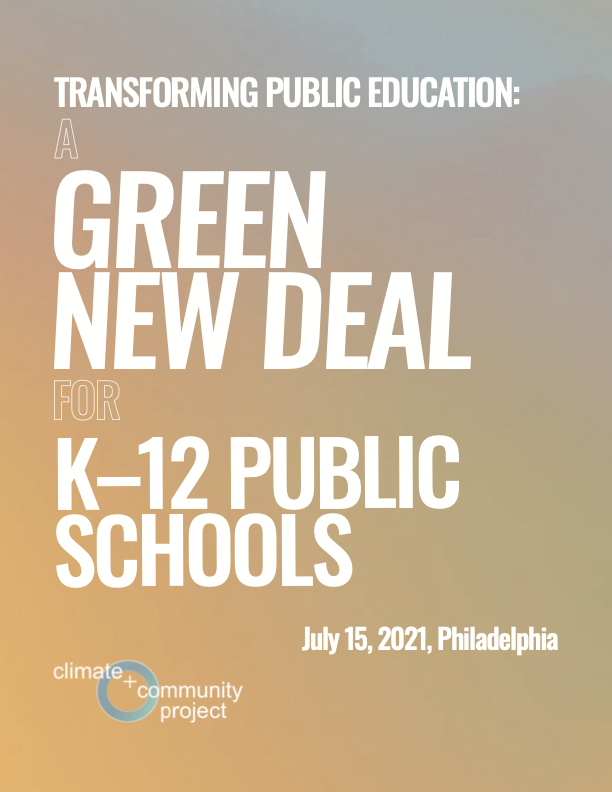On July 14, 2021, Rep. Jamaal Bowman (D-N.Y.), a lifelong educator and former middle school principal, unveiled the Green New Deal for Public Schools Act, introduced in the U.S. House of Representatives the following day alongside 32 cosponsors.
The ambitious new legislation — which aims to invest $1.43 trillion over 10 years in public schools and infrastructure to combat climate change —school building in the country, addressing historical harms and inequities by focusing support on high-need schools, and hiring and training hundreds of thousands of additional educators and support staff. If enacted, the legislation would fund 1.3 million jobs per year and eliminate 78 million metric tons of CO2 annually, the equivalent of taking 17 million cars off the road.
The legislation was based on a report written by an interdisciplinary team led by Dr. Akira Drake Rodriguez, Assistant Professor of City & Regional Planning, Weitzman School of Design at the University of Pennsylvania and Fellow at the climate + community project.
The Green New Deal for Public Schools proposes $1.43 trillion in new funding over 10 years, including the following distribution of resources:
$446 billion in Climate Capital Facilities Grants and $40 billion for a Climate Change Resiliency Program
Climate Capital Facilities Grants will fully fund healthy green retrofits for the highest-need third of schools, as measured by the CDC Social Vulnerability Index, and offer a mix of grant funding and no- or low-interest loans for the middle and top thirds. Grants will cover two-thirds and one-third of retrofit costs for these schools, respectively.
$250 billion in Resource Block Grants
Resource Block Grants will fund staffing increases, expanded social service programming, and curriculum development at high-need schools. The program will allow Local Educational Agencies across the country to hire and train hundreds of thousands of additional educators and support staff, including paraprofessionals, school psychologists and counselors, and learning specialists. The funds may also be used to design locally-rooted curricula; adopt trauma-informed, culturally responsive, and restorative justice practices, to move towards a “whole child” approach to public education; and partner with community organizations to offer a range of services to schools and surrounding neighborhoods, such as after-school programs.
$100 million for an Educational Equity Planning Grants Pilot Program
Educational Equity Planning Grants will encourage neighboring Local Education Agencies to form regional consortia, which will receive funding to conduct extensive community outreach, identify the historical and current sources of educational disparities within the region, and create and implement a Regional Education Equity Plan to address those disparities. This pilot program is modeled on the U.S. Department of Housing and Urban Development’s Sustainable Communities Regional Planning Grants, which are designed to encourage equitable, locally-driven economic development.
$695 billion over 10 years for Title I and IDEA (Individuals with Disabilities Education Act) increases
This bill proposes quadrupling Title I funding to reach $66 billion annually to support schools and districts with students living in poverty, as well as increasing funding for IDEA Part B to reach $33 billion annually to support students with disabilities.
Press for Green New Deal for Public Schools
Rodriguez, Akira Drake, Erika Kitzmiller, and Daniel Aldana Cohen, “Now is our time chance to rebuild U.S. public schools to address both climate change and racial inequality,” Time, July 30, 2021, https://time.com/6085517/green-new-deal-public-schools/.
Budds, Diana, “Green New Deal for Public Schools Goes Way Beyond Classrooms,” Curbed, July 23, 20121, https://www.curbed.com/2021/07/green-new-deal-for-public-schools-community-resilience-bowman.html
Alemany, Jacqueline. “New York lawmaker rolls out Green New Deal for public schools,” Washington Post, July 15, 2021, https://www.washingtonpost.com/politics/2021/07/15/climate-change-reconciliation-bill/.
